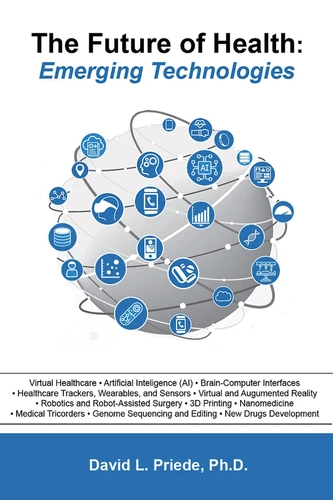The Future of Health: Emerging Technologies
Par :Formats :
Disponible dans votre compte client Decitre ou Furet du Nord dès validation de votre commande. Le format ePub est :
- Compatible avec une lecture sur My Vivlio (smartphone, tablette, ordinateur)
- Compatible avec une lecture sur liseuses Vivlio
- Pour les liseuses autres que Vivlio, vous devez utiliser le logiciel Adobe Digital Edition. Non compatible avec la lecture sur les liseuses Kindle, Remarkable et Sony
 , qui est-ce ?
, qui est-ce ?Notre partenaire de plateforme de lecture numérique où vous retrouverez l'ensemble de vos ebooks gratuitement
Pour en savoir plus sur nos ebooks, consultez notre aide en ligne ici
- FormatePub
- ISBN978-1-005-78894-0
- EAN9781005788940
- Date de parution24/08/2022
- Protection num.pas de protection
- Infos supplémentairesepub
- ÉditeurC. C. Chamberlane
Résumé
In the rapidly growing digital age, more technology once thought to be part of a distant future is now entering the medical field. Today, new technologies can reinvent the patient experience. The new landscape includes advancements in virtual healthcare, artificial intelligence, nanomedicine, virtual and augmented reality, robot-assisted surgery, 3D printing, wearable healthcare trackers, medical tricorders, genome sequencing, and new drug development.
These and other technological innovations will fundamentally change the nature of healthcare delivery by better connecting people with services, automating routine tasks, and analyzing patient health information to improve care decisions. New medical technologies limit human error, provide quicker diagnoses, and offer more treatment and opportunities for more patients. But the challenges of tomorrow are still prevalent.
There is still plenty to learn. Health will be defined as overall well-being, encompassing physical, mental, emotional, and social health. Healthcare is moving towards sustaining well-being rather than responding to illness. Technological healthcare will increase preciseness and reduce complexness in healthcare while being more economical and far-reaching.
These and other technological innovations will fundamentally change the nature of healthcare delivery by better connecting people with services, automating routine tasks, and analyzing patient health information to improve care decisions. New medical technologies limit human error, provide quicker diagnoses, and offer more treatment and opportunities for more patients. But the challenges of tomorrow are still prevalent.
There is still plenty to learn. Health will be defined as overall well-being, encompassing physical, mental, emotional, and social health. Healthcare is moving towards sustaining well-being rather than responding to illness. Technological healthcare will increase preciseness and reduce complexness in healthcare while being more economical and far-reaching.
In the rapidly growing digital age, more technology once thought to be part of a distant future is now entering the medical field. Today, new technologies can reinvent the patient experience. The new landscape includes advancements in virtual healthcare, artificial intelligence, nanomedicine, virtual and augmented reality, robot-assisted surgery, 3D printing, wearable healthcare trackers, medical tricorders, genome sequencing, and new drug development.
These and other technological innovations will fundamentally change the nature of healthcare delivery by better connecting people with services, automating routine tasks, and analyzing patient health information to improve care decisions. New medical technologies limit human error, provide quicker diagnoses, and offer more treatment and opportunities for more patients. But the challenges of tomorrow are still prevalent.
There is still plenty to learn. Health will be defined as overall well-being, encompassing physical, mental, emotional, and social health. Healthcare is moving towards sustaining well-being rather than responding to illness. Technological healthcare will increase preciseness and reduce complexness in healthcare while being more economical and far-reaching.
These and other technological innovations will fundamentally change the nature of healthcare delivery by better connecting people with services, automating routine tasks, and analyzing patient health information to improve care decisions. New medical technologies limit human error, provide quicker diagnoses, and offer more treatment and opportunities for more patients. But the challenges of tomorrow are still prevalent.
There is still plenty to learn. Health will be defined as overall well-being, encompassing physical, mental, emotional, and social health. Healthcare is moving towards sustaining well-being rather than responding to illness. Technological healthcare will increase preciseness and reduce complexness in healthcare while being more economical and far-reaching.





